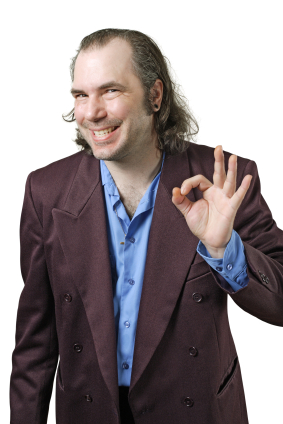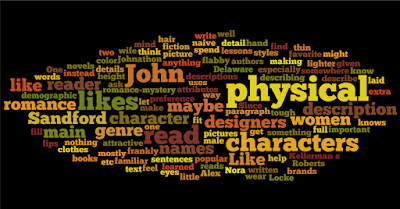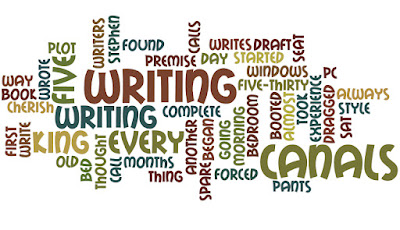As a follow-up to my last post on branding, here are my "crib notes" from a John Locke guest post on Jack Konrath's blog. John hung around the rest of the day, after the post went up, and answered questions. I extracted what I thought was important and saved it in Word.
If you'd rather read the original post you will find it here. Take a look at John Locke's author page on Amazon here to see how he's branded his books.
Why bother looking at what another self-published author has done? As an example of someone who treats their writing like a business, who formulated a business plan and executed it. And he stuck with it. Notice he said he'd made a combined $47 on Amazon through September 2010. He's well over $100K a month now because he didn't bail when his plan wasn't immediately successful.
I think it's possible to write in different genres, but if you do, you will likely need to make YOU your brand, not your books. Not impossible, but tougher, in my opinion.
JOHN LOCKE
- Marketing is all about giving people a place to go and a reason to go there. My advice is to start on Twitter. The Twitter author community is very supportive. That’s how I started. Next, write a blog that shows off your writing style. You can do much more, that’s all the marketing you will need, if you can build up a following. But it is KEY that your tweets and blogs give an insight into your writing style.
- I am a businessman, and I look at each of my books as an employee. I make a one-time investment in each of these “employees” ($995.00) and send them out into the world to make sales for me. Some employees do a better job than others. Right now I have six employees, and they are all in the top 100. This past Thursday night, my 7th employee, “A Girl Like You” went out into the world, and she is already #114. I trust her, and believe she will sell enough to get into the top 100 in the next few days. “She” has already earned back her investment. But unlike a real employee, I don’t have to deal with her in person, or match her social security or provide benefits. She works 24 hours a day for me for free, and will, for the rest of her life. --How can this not be the best investment in the world?
- I started writing about two years ago. I had no training, no experience, and never attended a seminar. It probably helped that I was an English major in college.
- I believe you CAN judge a book by it’s cover, and in fact, it’s one of the best ways to judge one! Again, your cover should appeal to your target audience.
- With my character, Creed, I want to give you a guy who is hard to like, then force you to like him. Women make up 75 to 80% of my audience, and those in my target group get the fact that what Creed really needs in his life is the right woman. My readers are the right woman for a guy like Creed, and when they see him saying something dumb, or making a bad decision, they shake their heads and laugh--because every one of my female readers is smarter than Creed when it comes to relationships, and they know it. They think he’s rough, but worth saving.
- I’m not writing for the masses, I’m writing to a specific audience. My audience likes my humor, understands my quirks, accepts my mistakes. They’re my closest friends. What better friends on earth can a person have than the people who love your books? I love--deeply and profoundly love--my readers, and I hope they love me, too. And Donovan Creed, despite our faults. I think they know our hearts are in the right place.
When that next book comes out, I’m hoping my family of readers will smile and say, “Hey--John’s home!” --and will welcome me with open arms. (--If this sounds like a silly fantasy to you, please don’t burst my bubble!)
- Kindle represents 90% of my sales.
- I praise a number of people on Twitter. I read their blogs and review their sites every chance I get. Sometimes I’m too busy to write each day, so I’ll save 10 or 15 comments and post them all at once. My friends forgive me for this, because when I see something I like, I mention it to my followers, and they usually check it out.
- You’re right in that marketing is often a matter of finding a need and filling it. In my case, I just wanted to write about this guy, Donovan Creed, and all the crazy people and situations he encounters. After I wrote my first three novels, I started trying to figure out who else in the world might like to get to know Creed.
- It takes me 100 hours to write a series novel, 150 if it’s a new one, like Follow the Stone.
I sort of have a review committee: I send my manuscript to three people before publishing, to get their take. These people “get” my work, and are not afraid to tell me when something in the story isn’t working for them. I trust their instincts most of the time.
As for increasing the price of my downloads, I don’t want to. I’m charging my reader less than a penny for each hour of my writing, and think that’s a fair exchange. In other words, if you hate my writing, remember, it’s only 99 cents. You could buy a flippin’ Starbucks mocha latte, or 5 of my books!
- Early on, more than a year ago, I offered a free book to the first 40 people who requested one on Twitter. Some were nice enough to give me reviews, though I didn’t ask for them. One thing I’ve learned since those days is to ask for reviews, though I haven’t given any freebies out.
- With the exception of Lethal People and Saving Rachel, I have paid the author, Winslow Eliot, to edit my books. I feel more comfortable doing that, because every time another set of eyes sees your manuscript, they will find something that everyone else has missed.
- As recently as September, my total book royalty income was, I believe, $47. People laughed at me, saying, “Why are you writing two more when you can’t sell the three you’ve already written?” I said, “When my audience finds me, they’re going to want five books, not three.”
- 99 cents will move ‘em off the fence.
- In my experience, Kindle book buyers are extremely astute, and I agree there are many who seek to discover a new talent. For 99 cents, they will give indie authors like you and me a try.
- The business model I was referring to is the idea itself: that your books can be offered on this world-wide platform for pennies, with all the accounting done for you, and you don’t owe any money until you make a sale. You don’t need an office, don’t need employees, or even a telephone. And for a one-time payment, you get a lifetime of income at a 35% royalty level. To me, it’s just an unbelievable business opportunity.
- How do I outline my novels? I don’t really outline them, I “write” the novel in my head, then type it out a scene at a time, whenever I find myself with a couple of unencumbered hours. But I never sit down at the keyboard unless I know exactly what I’m going to type. Not word-for-word, but pretty close.
- As for category, it would be great if your book fits in a thin one, where there is less competition. But you’re limited, since your book has to fit that category. The more precisely you can match, the more likely you’ll be able to find your target audience.














